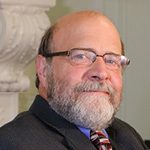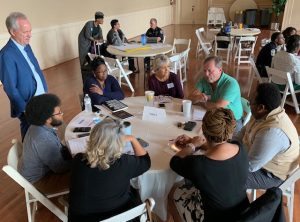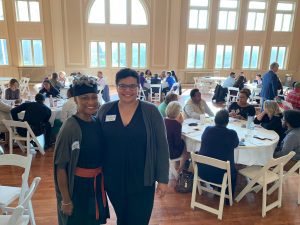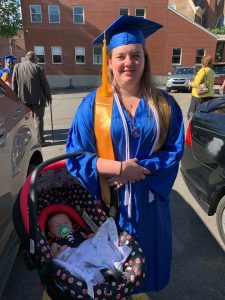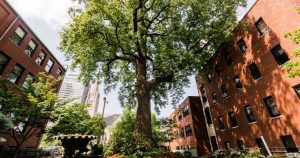Spalding University held its annual Commencement ceremony on Saturday at Canaan Christian Church, conferring bachelor’s, master’s and doctoral degrees to 614 students. Spalding also extended its tradition of conferring honorary degrees to members of the public who have made contributions to the greater good as well as awards to outstanding alumni, faculty and undergraduate students.
This year, the Spalding Board of Trustees presented three honorary doctorates – to business and community leader Ulysses Lee “Junior” Bridgeman (Honorary Doctor of Laws), to Humana co-founder David Jones Sr. (Honorary Doctor of Public Service) and to Sister of Charity Federation NGO representative to the United Nations Sister Teresa Kotturan, SCN (Honorary Doctor of Humane Letters).
Spalding presented the Caritas Medal – its highest honor for alumna of the year – to nursing leader Shirley Powers, who earned her bachelor of science in nursing from Spalding in 1972.
Dr. Pattie Dillon, Associate Professor of history and the Chair of the School of Liberal Studies, was named the Outstanding Faculty Award winner for 2019.
Spalding bestowed the honor of Faculty Emeritus/Emerita on three long-serving faculty members who are retiring with at least 25 years of service each at the university – School of Business Assistant Professor of Management David Hudson, School of Nursing Professor and Graduate Program Director Dr. Pamela King and School of Natural Science Associate Professor of Mathematics Dr. Marlene Will.
The two undergraduate student award winners were Teresa San Ngyuen, Bachelor of Arts in Psychology, who received the Mother Catherine Spalding Service Learning Award; and Kelsey Hamilton, Bachelor of Science in Education (Secondary and Middle Grades), who received the Meagher Senior Award.
Here’s a closer look at the honorary degree recipients and award winners from 2019, and congratulations to them all:
Honorary Doctor of Laws – Junior Bridgeman
He’s the owner and chief executive officer of Heartland Coca-Cola Bottling Co., LLC, which owns and operates a Coca-Cola production and manufacturing facility in Lenexa, Kansas, and 17 Coca-Cola distribution facilities sprinkled across the American heartland.
Prior to the 2017 acquisition of the Heartland bottling operations, Bridgeman was the owner and chief executive officer of various companies operating over 450 restaurants in 20 states, including 263 Wendy’s restaurants and 123 Chili’s restaurants, and his companies received several prestigious awards within the industry.
Bridgeman attended the University of Louisville, where he graduated in 1975 with a Bachelor’s degree in psychology. He was a three-year letter-winner and starter on the U of L basketball team, receiving All-American honors as a senior. He played professionally from 1975 to ’86 as a member of the Milwaukee Bucks and Los Angeles Clippers.
Bridgeman serves or has served on multiple governing boards, including for Meijer Inc., Churchill Downs, the Naismith Basketball Hall of Fame, the James Graham Brown Foundation, Simmons College, the West End School and U of L, where he was board chair.
Bridgeman’s personal honors include membership in the Junior Achievement Business Hall of Fame and the Kentucky Entrepreneur Hall of Fame and being named a recipient of the Volunteers of America Tribute Award for Outstanding Service to the Commonwealth of Kentucky; the John Thompson Foundation Outstanding Achievement Award; and the Coach John Wooden Key to Life Award.
Honorary Doctorate of Public Service – David A. Jones Sr.
He co-founded Humana Inc. in 1961 and served as chief executive officer for 37 years and board chair for 44 years prior to retiring in 2005. He served as founding board chairman of Hospira until his retirement in 2007. He is a retired director of Abbott Laboratories and several other companies.
Jones was a member of The Business Roundtable and co-founder and past chair of the Healthcare Leadership Council, a group of about 50 CEOs of the nation’s largest health care organizations.
Jones, a native of Louisville, Kentucky, and his wife, Betty, have five children and 11 grandchildren. He earned a bachelor’s degree from the University of Louisville in 1954, where he won the outstanding senior award. He also became a Certified Public Accountant that year. After three years of Navy service he entered Yale University, earning a law degree in 1960, while also serving on the economics faculty from 1958 to 1960. He received the Yale Law School Medal in 1990 and the Yale Medal in 1992.
In 2003, he received Romania’s highest civilian award, the Order of Merit, for his role from 1990-2006 in rebuilding that nation’s devastated health care system.
He also holds honorary doctorates from the Chicago Medical School, the Claremont Graduate School, the University of Louisville, Middlebury College, Transylvania University and Ovidius University, Constanta, Romania.
Honorary Doctor of Humane Letters – Teresa Kotturan, SCN
In her role as the NGO representative at the UN for the Sisters of Charity Federation, Kotturan’s primary objective is to bring the concerns of the 2,700 members of the federation and all those with whom and to whom they minister in 26 countries to the global stage of the UN. She is committed to raising awareness through the UN’s Sustainable Development Goals to end poverty, protect the planet, and ensure that all people live in peace and prosperity.
Kotturan has been a Sister of Charity of Nazareth for 49 years and previously served as Vice President of the SCN. She has also served as the Provincial Superior of the India Province for eight years.
Kotturan works to ensure that the voices of women religious and those they serve are heard. She strives to raise awareness for pressing global concerns such as poverty eradication, lack of access to education, human trafficking, human rights, global citizenship, migration and inter-religious dialogue, social development, financing for development, climate change and environmental sustainability.
Caritas Medalist (Alumna of the Year) – Shirley Burns Powers
The 1972 graduate of Spalding with a bachelor of science degree in nursing contributed to the advancement of health care and the profession of nursing in Louisville. She served as the Chief Information Officer for Norton Hospital and implemented the first clinical information system in the state. She advanced to become Administrator for Norton Hospital and Senior Executive Officer for Norton Healthcare.
Upon retirement, Shirley started Powers Consulting Inc. and worked as Coordinator of the Greater Louisville Workforce Consortium for the Kentucky Hospital Association and Jefferson County Public Schools to implement the health care magnets in three high schools. She has served as a consultant to the Humana Foundation on a tour to Romania to assist in the writing of a health care plan for that country and to Spalding University on matters of nursing and finance. Burns has served on the boards of many organizations, including ones focused on health care, nursing and helping children. Among the myriad awards and honors she’s received, Burns was a recipient in 1996 of a Lifetime Achievement Award from Spalding for Leadership in Nursing. Now she is receiving the university’s highest honor for any alum.
Outstanding Faculty Award – Pattie Dillon
With courses on the Civil War and Reconstruction, Jim Crow, gender history, and U.S. history since 1945, she has been praised for creating curriculum that is both rigorous and relevant to current events, and she is well-known around campus as being a very engaging teacher.
Dillon has undertaken scholarship work with the National Council for History Education, the Lilly Conference on College Teaching, and the Association for Interdisciplinary Studies.
Dillon serves as Faculty Senate President and the Board of Trustees’ Faculty Representative. She is also the faculty mentor for the mission societies and has served on several search committees. Off campus, she serves as President of the Kentucky Association of Teachers of History; as school board member for St. James Catholic School; as a member of the Dialogue on Diversity Conference Committee; and as Lead History Scholar for the Rivers Institute at Hanover College and the NEH Picturing America Grant’s Picturing America’s Changing Landscapes Workshop.
Designation as Professor Emeritus – David Hudson
He has taught of range of management courses in the School of Business while also possessing knowledge and experience in human resources, sales, marketing and public relations. He has been a faculty athletic representative for the Golden Eagles’ athletic program, and he is a 20-year U.S. Army veteran
Designation as Professor Emerita – Pam King
She has trained scores of nurses, nurse practitioners and other health care leaders as the director of the graduate nursing program. Outside of Spading, she has volunteered at the Family Community Clinic, which provides medical care to individuals and families who lack health insurance, and she’s used her position there as a platform to provide service learning opportunities for Spalding students.
Designation as Professor Emerita – Marlene Will
Dr. Will has spent most of her adult life associated with Spalding. She earned a bachelor’s degree in math and a master of arts in teaching at Spalding, then spent more than four decades as a professor at the university, where she also earned her doctorate in education. In teaching a variety of math courses – from college alegbra to statistics, as well as mathematics for teachers – Dr. Will played a part in the college journey of countless students from all manner of majors and degree programs.
Mother Catherine Spalding Service Learning Award – Teresa San Nguyen
Annually, this award recipient embodies the spiritual values of faith, hope and charity, which emulate Spalding’s founder, Mother Catherine Spalding. On campus, Nguyen has been a work-study in the library and a psychology tutor. Off campus, she has been heavily involved with the Vietnamese Eucharist Movement, leading youth groups there, and she volunteers at Centerstone in the crisis management center.
Mother Rose Meagher Senior Award – Kelsey Hamilton
This award goes annually to a person who has performed well academically and has a proven record as a mature leader and member of the campus community. Hamilton has been praised by faculty for her academic excellence, work ethic, maturity, judgment, helpfulness and creativity. As a work-study in the College of Education and as a student teacher at the Brown School, she has been praised for her initiative to complete tasks, her professionalism and her knowledge of mathematics content. She has also been a successful member of the Spalding track and field team and active member of the Kentucky Education Association Student Program. Hamilton collected more than 500 children’s books for the Rutherford Elementary Reads program.
